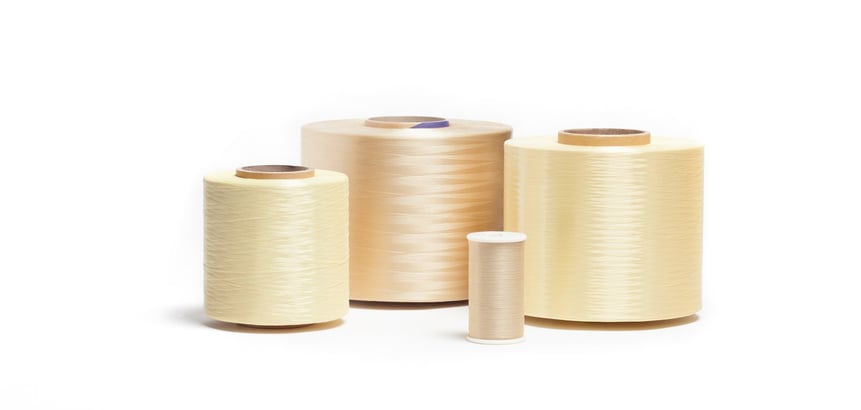
Meet your standard for heat and flame resistance with fire retardant thread and yarn.
When a manufacturer is seeking a synthetic fiber that meets specific standards for heat and flame resistance, or one that demands extreme tensile strength, two materials are widely known for these characteristics: Dupont™ Nomex® and Dupont™ Kevlar® composite materials. Each of these belong to the class of aramid fibers with the general characteristics which include a high melting point, a high strength to weight ratio and low elongation at break.
Dupont™ Nomex® is a meta-aramid fiber which means it is highly resistant to temperature, chemical degradation and abrasion. Meta-aramid fibers generally have a Tenacity of about 5.6g/den, which can compare to Mid-Tenacity nylon and polyester fibers. These fibers can withstand tensile stress (the maximum stress a material can withstand) while exposed to flames and temperatures up to 400 degrees Celsius.
Dupont™ Kevlar® and lower cost alternatives are para-aramid fibers that display a high tensile strength and modulus behavior (tendency of a material to deform when force is applied). Para-aramid fibers can be manufactured with Tenacity around 23g/den and elongation at break ~3.5%.
Learn more about Kevlar® alternatives here.
Fire retardant sewing thread is used where flame or heat resistance is required. Here are some of the characteristics of the two most common classes of aramid fibers:
Dupont™ Nomex® (Meta-Aramid):
- Longer-term resistance to heat than Kevlar®
- Optimal resistance to heat exposure
- Excellent abrasion resistance
- Durable and long-lasting
- Decomposes when exposed to chlorine bleach
- Excellent mildew resistance
Dupont™ Nomex® is used in protective fabrics, garments, insulation and other high-performance applications where flame resistance is required.
Dupont™ Kevlar® (Para-Aramid):
- Resistance to short-term heat exposure
- High single end break
- Excellent mildew resistance
- Durable and long-lasting
- Decomposes when exposed to chlorine bleach
Dupont™ Kevlar® sewing thread and lower cost alternatives feature five times the strength of steel and are used in a variety of clothing, accessories and equipment where fire resistance is required.
It is also possible to make materials such as Cotton, Polyester and Nylon flame retardant/resistant by applying a suitable FR treatment. Yarns or fabrics can be padded or dipped in the treatment, dried and cured via thermosol heat treating for improved durability. Many treatments are available which have advantages of being Non-halogen, Non-toxic, produce soft handle and are durable to laundering and dry cleaning. These FR thread and yarn treatments do not make synthetic materials heat resistant, they will still melt at their melting point, but will not ignite with the correct level of treatment.
Get help choosing the right fire-resistant thread or yarn for your manufacturing needs. Contact us today.




